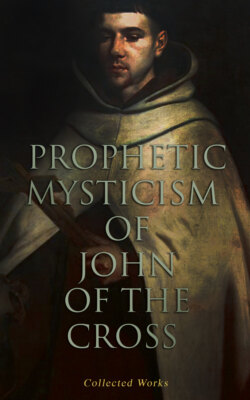Читать книгу Prophetic Mysticism of John of the Cross (Collected Works) - John ofthe Cross - Страница 34
На сайте Литреса книга снята с продажи.
ОглавлениеCHAPTER XIV
Table of Contents
Wherein are set down and explained the last three lines of the first stanza.
This happy chance was the reason for which the soul speaks, in the next lines, as follows: I went forth without being observed, My house being now at rest.
It takes the metaphor from one who, in order the better to accomplish something, leaves his house by night and in the dark, when those that are in the house are now at rest, so that none may hinder him. For this soul had to go forth to perform a deed so heroic and so rare—namely to become united with its Divine Beloved—and it had to leave its house, because the Beloved is not found save alone and without, in solitude. It was for this reason that the Bride desired to find Him alone, saying: ’ Who would give Thee to me, my brother, that I might find Thee alone, without, and that my love might be communicated to Thee.’ It is needful for the enamoured soul, in order to attain to its desired end, to do likewise, going forth at night, when all the domestics in its house are sleeping and at rest—that is, when the low operations, passions and desires of the soul (who are the people of the household) are, because it is night, sleeping and at rest. When these are awake, they invariably hinder the soul from seeking its good, since they are opposed to its going forth in freedom. These are they of whom Our Saviour speaks in the Gospel, saying that they are the enemies of man. And thus it would be meet that their operations and motions should be put to sleep in this night, to the end that they may not hinder the soul from attaining the supernatural blessings of the union of love of God, for, while these are alive and active, this cannot be. For all their work and their natural motions hinder, rather than aid, the soul’s reception of the spiritual blessings of the union of love, inasmuch as all natural ability is impotent with respect to the supernatural blessings that God, by means of His own infusion, bestows upon the soul passively, secretly and in silence. And thus it is needful that all the faculties should receive this infusion, and that, in order to receive it, they should remain passive, and not interpose their own base acts and vile inclinations.
2. It was a happy chance for this soul that on this night God should put to sleep all the domestics in its house—that is, all the faculties, passions, affections and desires which live in the soul, both sensually and spiritually. For thus it went forth ‘without being observed’—that is, without being hindered by these affections, etc., for they were put to sleep and mortified in this night, in the darkness of which they were left, that they might not notice or feel anything after their own low and natural manner, and might thus be unable to hinder the soul from going forth from itself and from the house of its sensuality. And thus only could the soul attain to the spiritual union of perfect love of God.
3. Oh, how happy a chance is this for the soul which can free itself from the house of its sensuality! None can understand it, unless, as it seems to me, it be the soul that has experienced it. For such a soul will see clearly how wretched was the servitude in which it lay and to how many miseries it was subject when it was at the mercy of its faculties and desires, and will know how the life of the spirit is true liberty and wealth, bringing with it inestimable blessings. Some of these we shall point out, as we proceed, in the following stanzas, wherein it will be seen more clearly what good reason the soul has to sing of the happy chance of its passage from this dreadful night which has been described above.
